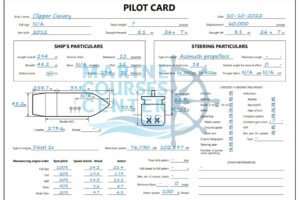
Navigating Smoothly: The Importance of a Magnetic Off Course Alarm
Table of Contents
Navigating Smoothly: The Importance of a Magnetic Off Course Alarm

Introduction to The Importance of a Magnetic Off Course Alarm
Welcome aboard! Today, we’re diving into the crucial world of ship navigation and the significance of a magnetic off course alarm. As a ship captain or crew member, it’s essential to understand how this innovative technology plays a pivotal role in keeping vessels on track, ensuring a safe and efficient voyage.
The Perils of Gyrocompass and The Importance of a Magnetic Off Course Alarm
Picture this: a beautiful ship gliding through the vast ocean, guided by a gyrocompass. But what happens when the gyrocompass wanders off course? Faults in the system or disruptions in the electric supply can throw a ship into disarray, following an erratic path undetected by the autopilot or course recorder. That’s where the ‘Magnetic Compass Off Course Alarm’ comes to the rescue.
This remarkable unit, often integrated with the autopilot, acts as a reliable guardian angel, alerting the crew when the gyrocompass shows signs of wandering. With its two input control knobs, it allows for precise customization:
- Course input control: This dial enables inputting the course according to the magnetic compass reading. By aligning the magnetic and gyro courses, it establishes a baseline for comparison.
- Tolerance control: This dial sets the maximum allowable deviation in yaw before triggering the alarms. It’s like defining the acceptable limits within which the ship can sway without raising any concerns.
Keeping the Course on Track and The Importance of a Magnetic Off Course Alarm
Once the gyrocompass settles on a course and the magnetic compass reading is fed in, the magnetic off course alarm springs into action. If the compass course strays beyond the tolerance value, audible and visible alarms are activated, immediately catching the attention of the crew.
Regular testing is essential to ensure the alarm’s effectiveness. As part of their watch duties, crew members should initiate a test by intentionally deviating from the preset magnetic course. For instance, if the compass course reads 045° with a tolerance set at 8°, turning the Course Input Control to less than 037° or more than 053° would trigger the alarms. Resetting the input within the acceptable range would then deactivate the alarms.
A Smooth Sailing Experience and The Importance of a Magnetic Off Course Alarm
Now that we understand the significance of the magnetic off course alarm, let’s appreciate the peace of mind it brings to both crew and passengers. By promptly alerting the crew to any deviations in the gyrocompass, this advanced technology ensures a smooth and secure sailing experience.
So, next time you embark on a ship journey, take a moment to appreciate the invisible hero aboard—the magnetic off course alarm. Its diligent watchfulness guarantees your voyage stays true to the intended course, promising a memorable and worry-free adventure on the high seas.
What is the purpose of a magnetic off course alarm on a ship?
A magnetic off course alarm is designed to alert the ship’s crew when the gyrocompass deviates from its intended course, ensuring safe and efficient navigation.
How does the magnetic off course alarm address issues caused by gyrocompass wander?
The magnetic off course alarm acts as a safeguard against gyrocompass wander by alerting the crew when the gyrocompass deviates from its intended course due to system faults or disruptions.
What are the main controls of a magnetic off course alarm?
The magnetic off course alarm features two input control knobs: the Course Input Control, which aligns the gyro and magnetic compass courses, and the Tolerance Control, which sets the maximum allowable deviation before triggering alarms.
How does the magnetic off course alarm work to maintain the ship’s course?
Once the gyrocompass course and magnetic compass reading are synchronized, the alarm monitors any deviations. If the compass course strays beyond the set tolerance value, audible and visible alarms are activated to alert the crew.
What is the role of regular testing for the magnetic off course alarm?
Regular testing ensures the alarm’s effectiveness. Crew members intentionally deviate from the preset magnetic course within acceptable limits, triggering alarms. Resetting the input within the range deactivates the alarms.
The Importance of Lifeboat Markings Ensuring Safety and Compliance at Sea
Tag:Navigation, safety, Ship technology
Leave A Reply
You must be logged in to post a comment.




1 Comment